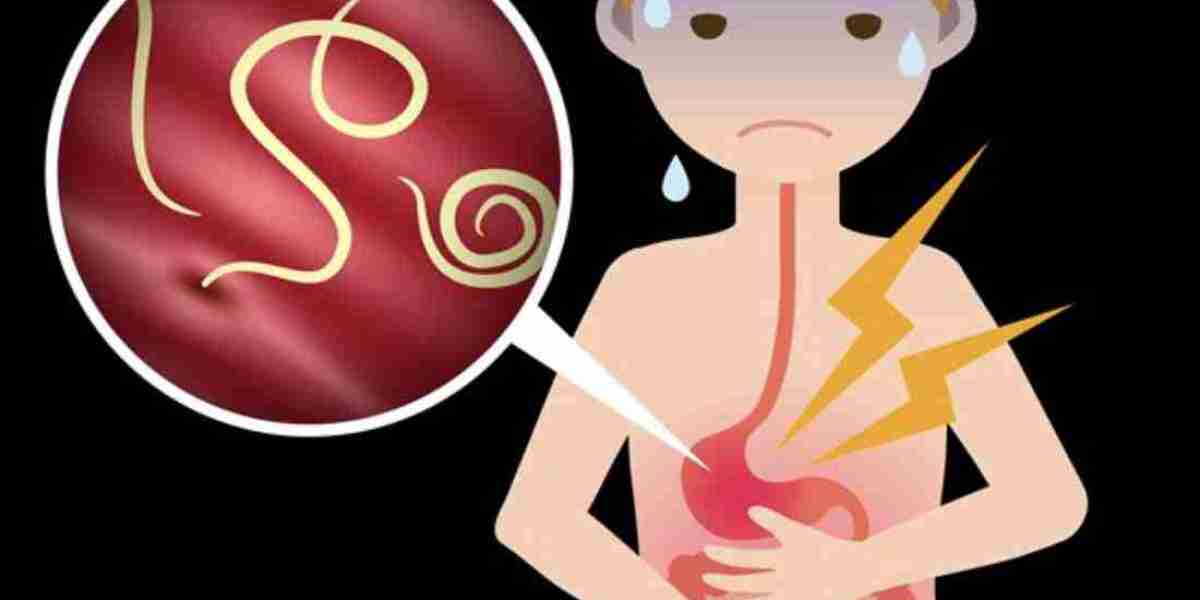Parasitic worm infections, also known as helminth infections, are caused by various types of parasitic worms that invade the human body. These infections can affect multiple organs and cause a wide range of symptoms. While some people may experience mild or no symptoms, others may suffer from severe complications. Understanding the symptoms, types of parasitic worm infections, and available treatments, including Nizonide 500mg, is essential for effective management and recovery.
Types of Parasitic Worm Infections
Roundworm Infections (Ascariasis)
Hookworm Infections
Tapeworm Infections
Pinworm Infections (Enterobiasis)
Whipworm Infections (Trichuriasis)
Liver Fluke Infections
Schistosomiasis
Each of these infections presents unique symptoms, but they often share common signs of infestation. Below is a detailed overview of the symptoms associated with parasitic worm infections.
Common Symptoms of Parasitic Worm Infections
1. Gastrointestinal Symptoms
Many parasitic worms inhabit the digestive tract, leading to symptoms such as:
Abdominal pain: Persistent discomfort, cramping, or bloating.
Diarrhea: Frequent loose stools, sometimes mixed with mucus or blood.
Nausea and vomiting: Common in severe infestations.
Loss of appetite: Decreased interest in food due to digestive distress.
Weight loss: Unexplained weight loss due to poor nutrient absorption.
2. Fatigue and Weakness
Parasitic worms consume essential nutrients, leading to:
Chronic fatigue: Persistent tiredness and lack of energy.
Anemia: Caused by blood loss in hookworm infections.
3. Skin Reactions
Certain parasitic worm infections lead to skin manifestations such as:
Itchy rashes: Seen in schistosomiasis or hookworm infections.
Redness and irritation: Particularly in areas of parasite entry.
Hives and allergic reactions: Due to immune system response.
4. Respiratory Issues
Some parasitic worms migrate to the lungs, causing:
Coughing: Persistent or dry cough.
Shortness of breath: In severe cases of roundworm infections.
Wheezing: May mimic asthma-like symptoms.
5. Neurological Symptoms
Severe cases of parasitic infections can affect the nervous system, leading to:
Seizures: Seen in neurocysticercosis caused by tapeworms.
Headaches: Persistent or severe headaches.
Confusion and dizziness: Due to parasite migration in the brain.
6. Sleep Disturbances
Insomnia: Itchy skin (especially in pinworm infections) can disrupt sleep.
Restlessness: Parasite-induced discomfort may lead to poor sleep quality.
Transmission and Risk Factors
Parasitic worm infections spread through various means, including:
Contaminated food and water.
Poor hygiene practices.
Skin contact with infected soil.
Consumption of undercooked meat or fish.
Insect bites (e.g., mosquitoes spreading filarial worms).
Diagnosis of Parasitic Worm Infections
Doctors use various methods to diagnose these infections, such as:
Stool examination: Identifying eggs or larvae.
Blood tests: Checking for parasite-related antibodies.
Imaging tests: CT scans, MRIs for brain or organ involvement.
Skin biopsy: Used in specific cases like filariasis.
Treatment Options for Parasitic Worm Infections
Treatment depends on the type of parasitic worm causing the infection. Various anti-parasitic medications are available, with nizonide 500mg being one of the most effective drugs for treating specific infections.
Nizonide 500mg: A Powerful Antiparasitic Drug
Nizonide 500mg contains Nitazoxanide, an effective broad-spectrum antiparasitic and antiviral medication. It works by interfering with the parasite’s metabolism, leading to its elimination.
Benefits of Nizonide 500mg
Effective against multiple parasitic infections: Especially Giardia, Cryptosporidium, and some helminths.
Well-tolerated: Minimal side effects compared to other anti-parasitic drugs.
Short treatment duration: Typically prescribed for a few days to a week.
Dosage and Administration
Adults and Children (above 12 years): Usually 500mg twice daily for 3-7 days.
Children (below 12 years): Dosage varies based on weight and doctor's prescription.
Preventive Measures Against Parasitic Worm Infections
To reduce the risk of infection, follow these preventive strategies:
Maintain proper hygiene: Regular hand washing with soap.
Drink clean water: Avoid unfiltered or untreated water.
Cook food properly: Ensure meat and fish are well-cooked.
Wear protective clothing: Especially in high-risk areas.
Regular deworming: Periodic deworming in endemic regions.
When to See a Doctor?
Seek medical attention if you experience:
Persistent gastrointestinal issues.
Severe weight loss or malnutrition.
Neurological symptoms like seizures or confusion.
Symptoms that do not improve with over-the-counter medications.
Conclusion
Parasitic worm infections can significantly impact health if left untreated. Recognizing symptoms early and seeking appropriate treatment, including Nizonide 500mg, can help manage and eliminate these infections effectively. Maintaining good hygiene, consuming safe food and water, and periodic deworming are essential preventive measures. If you suspect a parasitic infection, consult a healthcare provider for proper diagnosis and treatment.













